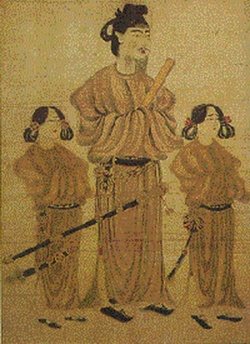Difference between revisions of "Prince Shotoku"
Jump to navigation
Jump to search
(Created page with "thumb|250px| Prince Shotoku (573-621) was the son of Emperor Yomei of Japan and ruled as regent for many years. He introduced Buddhism to his country f...") |
|||
| Line 1: | Line 1: | ||
[[File:Shotoku.JPG|thumb|250px|]] | [[File:Shotoku.JPG|thumb|250px|]] | ||
| − | Prince Shotoku (573-621) was the son of Emperor Yomei of Japan and ruled as regent for many years. He introduced Buddhism to his country from China together with the best of Chinese culture – music, administrative practices, calligraphy and art. In 605 he gave Japan its first written constitution which was imbued with Buddhist ethical principles and which was to have a profound influence on later political thinking. Unlike other modern constitutions which seek to organize a form of government, the Seventeen-point Constitution stressed the importance of personal integrity (in the ruler, government servants and citizens) and social harmony. | + | [[Wikipedia:Prince Shōtoku|Prince Shotoku]] (573-621) was the son of [[Wikipedia:Emperor Yōmei|Emperor Yomei]] of [[Japan]] and ruled as {{Wiki|regent}} for many years. He introduced [[Buddhism]] to his country from [[China]] together with the best of {{Wiki|Chinese culture}} – [[music]], administrative practices, {{Wiki|calligraphy}} and [[art]]. In 605 he gave [[Japan]] its first written constitution which was imbued with [[Buddhist]] [[ethical]] {{Wiki|principles}} and which was to have a profound influence on later {{Wiki|political}} [[thinking]]. Unlike other {{Wiki|modern}} constitutions which seek to organize a [[form]] of government, the Seventeen-point {{Wiki|Constitution}} stressed the importance of personal integrity (in the [[ruler]], government servants and citizens) and {{Wiki|social}} [[harmony]]. |
| − | A History of Japanese Buddhism, S. Hanayama, 1966 | + | A History of [[Japanese Buddhism]], S. Hanayama, 1966 |
{{R}} | {{R}} | ||
[http://www.buddhisma2z.com/content.php?id=372 www.buddhisma2z.com] | [http://www.buddhisma2z.com/content.php?id=372 www.buddhisma2z.com] | ||
[[Category:Buddhist Terms]] | [[Category:Buddhist Terms]] | ||
[[Category:Japanese Buddhism]] | [[Category:Japanese Buddhism]] | ||
Latest revision as of 14:31, 5 July 2014
Prince Shotoku (573-621) was the son of Emperor Yomei of Japan and ruled as regent for many years. He introduced Buddhism to his country from China together with the best of Chinese culture – music, administrative practices, calligraphy and art. In 605 he gave Japan its first written constitution which was imbued with Buddhist ethical principles and which was to have a profound influence on later political thinking. Unlike other modern constitutions which seek to organize a form of government, the Seventeen-point Constitution stressed the importance of personal integrity (in the ruler, government servants and citizens) and social harmony.
A History of Japanese Buddhism, S. Hanayama, 1966
